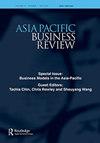The effects of differential organizational culture types on firm and individual performance in Eastern and Western cultural countries including China and the United States: a meta-analysis
IF 1.9
4区 管理学
Q3 BUSINESS
引用次数: 0
Abstract
ABSTRACTTo study the differences in the firm-level and individual-level performance in different organizational cultures, we employ meta-analysis methods to examine the differential impact of the clan, adhocracy, hierarchy, and market culture on firm and individual performance, basing on the Competing Values Framework (CVF) classification. This article includes 49 studies with 76,437 firm-level samples and 32 studies with 99,621 individual-level samples, we find that at both firm and individual level, the positive impact of adhocracy culture on performance is strongest, and hierarchy culture has the weakest impact, we also uncover that clan culture has the stronger impact on performance at the individual level; while adhocracy culture and market culture have the stronger impact on performance at the firm level. In addition, results also show how organizational cultures differ in the context of Eastern culture and Western culture.KEYWORDS: Organizational culturecompeting values frameworkEastern and Western cultureperformancemeta-analysis Disclosure statementNo potential conflict of interest was reported by the author(s).Additional informationFundingThis study was supported by Shanghai Philosophy and Social Science Planning Project [Grant number: 2019EGL013].Notes on contributorsHaifeng WangDr. Haifeng Wang is associate professor at School of Business and Management, Shanghai International Studies University. He has previously published over 10 peer-reviewed studies in journals, such as Journal of Operations Management, Journal of Product Innovation Management, Scientometrics, and Asia Pacific Journal of Management. His research interests are social network, entrepreneurship, and innovation management.Jing LiMiss. Jing Li is a PhD candidate at School of Business and Management, Shanghai International Studies University. Her research interests are social network and entrepreneurship.Pengfei HanDr. Pengfei Han is assistant professor at School of Accounting, Nanjing University of Finance and Economics. He has previously published a number of peer-reviewed studies in journals, such as Economic Modelling, Journal of Business & Industrial Marketing, and Scientometrics. His research interests are enterprise group, corporate governance, and bond pricing.Liang OuyangMr. Liang Ouyang is a master graduate at School of Business and Management, Shanghai International Studies University. His research interests are social network, culture management and innovation management.不同组织文化类型对包括中国和美国在内的东西方文化国家企业和个人绩效的影响:一项元分析
摘要为了研究不同组织文化下企业和个人绩效的差异,本文基于竞争价值观框架(CVF)分类,采用元分析方法考察了宗族文化、民主文化、等级文化和市场文化对企业和个人绩效的差异影响。本文共纳入49项研究(76,437个公司层面样本)和32项研究(99,621个个人层面样本),发现在公司和个人层面,民主文化对绩效的正向影响最强,等级文化对绩效的正向影响最弱;在个人层面,家族文化对绩效的正向影响更强;而在企业层面上,民主文化和市场文化对绩效的影响更大。此外,结果还显示了组织文化在东西方文化背景下的差异。关键词:组织文化竞争价值观框架东西方文化绩效meta分析披露声明作者未报告潜在的利益冲突。本研究由上海市哲学社会科学规划项目[批准号:2019EGL013]资助。作者简介:王夏峰博士。王海峰,上海外国语大学工商管理学院副教授。他曾在《Journal of Operations Management》、《Journal of Product Innovation Management》、《Scientometrics》和《Asia Pacific Journal of Management》等期刊上发表过10多篇同行评议的研究论文。主要研究方向为社会网络、创业、创新管理。京LiMiss。李静,上海外国语大学工商管理学院博士研究生。她的研究兴趣是社交网络和创业。Pengfei HanDr。韩鹏飞,南京财经大学会计学院助理教授。他曾在《经济建模》、《商业与工业营销杂志》和《科学计量学》等期刊上发表过许多同行评议的研究论文。主要研究方向为企业集团、公司治理、债券定价。梁OuyangMr。梁欧阳,上海外国语大学工商管理学院硕士研究生。主要研究方向为社会网络、文化管理、创新管理。
本文章由计算机程序翻译,如有差异,请以英文原文为准。
求助全文
约1分钟内获得全文
求助全文
来源期刊

Asia Pacific Business Review
Multiple-
CiteScore
4.40
自引率
13.80%
发文量
70
期刊介绍:
The growth of the Asia Pacific region and the rising presence of its multinationals in world markets has raised a number of questions about the origins of national economic success. Asia Pacific Business Review addresses these key issues and draws together the lessons of the analysis of culture, economies, history, politics and societies in the area, in order to explore business-related phenomena in the Asia Pacific countries, both in their general and specific contexts. The Review is intended for both academics and interested observers, contains the contributions of recognized experts, and is essential to anyone seeking the latest research on Asia Pacific business in a readily available, approachable form. We welcome articles which deal with nations and societies in the Asia Pacific region, namely those in East Asia and South-East Asia (but not South Asia), including those in APEC and ASEAN, individually or comparatively. Of interest also are contributions on the Asia Pacific economies, comparing those inside with those outside, or those investing in it. We do not, however, publish papers based solely on countries from outside the region.
 求助内容:
求助内容: 应助结果提醒方式:
应助结果提醒方式:


